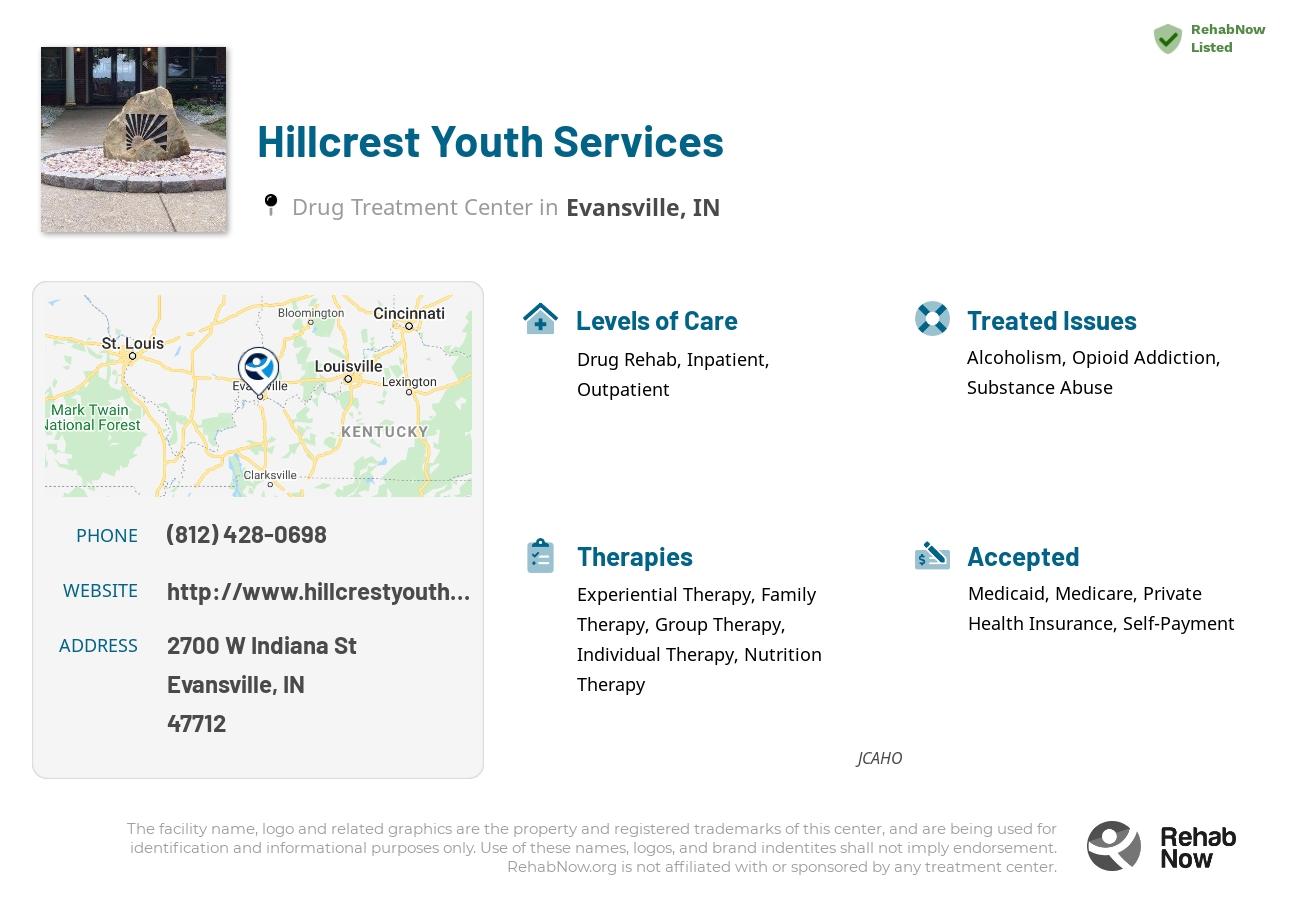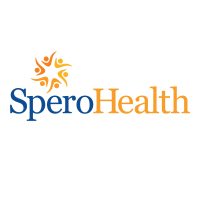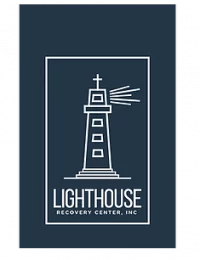Hillcrest Youth Services
Drug Rehab Center in Evansville, Indiana
Hillcrest Youth Services in Evansville, IN is an accredited JCAHO addiction treatment facility that offers comprehensive inpatient and outpatient care, as well as aftercare support, to help individuals suffering from alcoholism, opioid addiction, substance abuse, and/or mental health issues recover and achieve lasting sobriety.
About
Hillcrest Youth Services, based in Evansville, IN, primarily focuses on supporting the positive development of youths between the ages of 10-21. As a not-for-profit community-based residential facility, it stands out for its commitment to educating and reshaping the futures of young people. Its unique approach caters to both males and females who require guidance and support due to legal or social circumstances.
Accredited by JCAHO, Hillcrest Youth Services is recognized for its excellence in treating alcoholism, opioid addiction, substance abuse, drug addiction, and mental health issues. They employ a variety of innovative and effective treatment methods, ensuring that every individual receives the specialized care they need for recovery.
- Community-Based Approach: Hillcrest fosters a nurturing environment that emphasizes the importance of functioning within a family and society.
- Comprehensive Age Range: Catering to youths ages 10-21, Hillcrest offers a broad spectrum of care tailored to young individuals at various life stages.
- Accreditation and Quality: Being JCAHO accredited highlights Hillcrest's commitment to maintaining high standards in treatment and care delivery.
Hillcrest Youth Services addresses a wide array of issues, including alcoholism, opioid addiction, other substance abuses, and mental health challenges. By offering both inpatient and outpatient programs, alongside aftercare support, they provide a continuum of care designed to support long-term recovery and independence.
Genders
Ages
Modality
Additional
Accreditations

JCAHO
Conditions and Issues Treated
Recovering from substance abuse is an essential part of a healthy life for many people. It’s a long and challenging process, but it can be worth it in the end if you manage to get through all parts. Detoxifying your body, rehabilitation after that time passes or when needed (depending on what type), and then recovery while also receiving therapy support throughout this entire process.
A standard route to starting recovering from substance abuse and addiction is through a detoxification center. There you can completely heal your body and mind and continue on the path of recovery without feeling any of the lingering effects of substances.
Levels of Care Offered
This center offers a variety of custom treatment tailored to individual recovery. Currently available are Aftercare Support, Drug Rehab, Inpatient, Outpatient, with additional therapies available as listed below.
Inpatient treatment centers offer a safe, secure, and often medically supervised environment for drug or alcohol-addicted individuals. Many of these facilities are equipped to provide detoxification, treatment for co-occurring mental health disorders, and aftercare programs.
The patient typically spends 28 to 30 days at the facility and will receive extensive drug counseling. They will also learn how to live without drugs and how to make the right decisions in life.
An outpatient treatment program is set up to help with alcohol or drug addiction or a co-occurring disorder. The treatment must attend the treatment facility for their therapy and other programs but return home each night. The frequency of mandatory attendance decreases after much of the treatment program is complete. The treatment programs are monitored by the treatment facility and case managers who work for a judge or judge’s office. A treatment program may be performed out of a treatment facility, treatment clinic, or treatment center.
The benefits of outpatient treatment programs are many. One of the most beneficial treatment programs is that it allows treatment for clients who cannot afford or may not be able to attend treatment at a treatment facility, treatment center, or treatment clinic full-time. Another benefit of treatment programs is that they reduce crime rates because treatment allows people to treat their addiction.
Recovering drug addicts need aftercare support when they leave treatment. The support can include guidance through 12-step programs, outpatient rehabilitation programs, and support groups. Aftercare supports the individual in their desire to maintain sobriety by reducing relapse risk with positive choices.
The success of drug treatment does not end when the addict leaves the rehabilitation center. There is no such thing as a “one and done” type of rehabilitation process. Recovery is a lifelong journey that begins with treatment and continues by the addict committing to outside support groups or drug rehab programs.
When choosing a program, it is crucial to choose one that will provide long-term aftercare support. This ensures that you have the tools you need to sustain your recovery.
Therapies & Programs
The therapies typically involve all family members, potentially including siblings, children, and parents who play a role in their daily lives. These sessions can be essential because they address past issues that may have affected an addict or alcoholic’s recovery process. They provide support during this time when it is needed most!
A family therapy session, often called a family meeting or intervention, is a necessary process that helps loved ones of addicts see their situation in a new light. It’s also one of the most challenging things families will ever have to do when they’re facing a loved one battling addiction or alcoholism.
Group therapy sessions provide recovering addicts with a chance to cope with everyday situations that many face. Group therapy sessions are held in rehab facilities, clinics, churches or community centers that offer drug addiction treatment.
People who attend these groups are encouraged to voice their feelings and support other addicts in recovery. This helps group members strengthen their own recovery program while cheering on others who are struggling with sobriety.
Trauma therapy allows them to work through past trauma to have peace of mind and begin down the road of sobriety. The therapist will work with the individual to help them understand their past and present relationships. Patients may often believe that something is inherently wrong with them or they are unworthy of love. The therapist aims to correct these negative feelings and behaviors by helping the person realize that their actions do not reflect who they truly are.
Cognitive Behavioral Therapy (CBT) is a highly effective treatment option based on the idea that how we feel, think and act all interact together. Our thoughts determine our feelings and behaviors; our feelings affect our thoughts, and our behaviors change our thoughts and feelings. CBT helps people explore their thoughts for problems (or false beliefs) that influence their mood and actions. By examining their thoughts and beliefs, people can recognize distorted or irrational and modify them to more realistic, positive ones. CBT is very goal-oriented, which means that the therapist and patient work together on a specific problem while learning to become more adept at solving future problems.
CBT works well with a broad range of people, including those with depression, anxiety disorders, eating disorders, and problems with anger. In addition to helping a client focus on thoughts that can be changed, CBT also allows them to take an active role in their treatment. This is called a collaborative approach because both patient and therapist work together to produce the best possible results.
CBT is based on cognitive learning theory, which says that our behavior is a learned response to our environment. Cognitive refers to thoughts and beliefs, while behavioral relates to actions or deeds. CBT helps people learn ways of behaving to improve their quality of life by focusing on specific problems or goals they want to achieve. Sometimes, CBT is used alone; other times, it is combined with medications or brief counseling techniques such as solution-focused and motivational interviewing to achieve optimal results for the patient.
Behavioral therapies, such as contingency management, are widely used to improve drug addiction outcomes. Contingency management is a type of CM that uses rewards to increase desired behaviors, such as abstinence. LPE is a highly effective and low-cost treatment that has been used with populations across the intellectual and developmental spectrum for decades. It is based on the principle that reinforcing desired behavior will increase the likelihood of that behavior occurring again in the future.
LPE has become an integral component of outpatient substance abuse treatment and relapse prevention for both adults and adolescents. It is similar to contingency management programs used in substance abuse treatment, and clinical studies have shown that it can effectively treat drug addiction, reduce the number of days using drugs, and prevent relapse.
Payment Options Accepted
For specific insurance or payment methods please contact us.
Additional Details
Specifics, location, and helpful extra information.
Evansville, Indiana 47712 Phone Number(812) 428-0698 Meta DetailsUpdated April 15, 2024
Staff Verified
Patient Reviews
There are no reviews yet. Be the first one to write one.
Evansville, Indiana Addiction Information
The state of Indiana ranks 14th in the nation for drug abuse, but 17th for drug overdoses. The state has many high-quality rehabilitation centers, but reports show that there are about 20 deaths per 100,000 people. This is due to its location making it a drug trafficking haven, where many drugs are further distributed into the country.
The drug addiction problem in Evansville, IN, is unfortunately quite severe. According to statistics, there were over 1,000 emergency room visits related to drug overdoses in Evansville alone. Cocaine is the most commonly abused drug. Businesses may suffer from decreased productivity and an increase in absenteeism. If you or someone you know is struggling with drug addiction and abuse, drug treatment facilities can provide the help you need to get sober.
Treatment in Nearby Cities
- Greencastle, IN (121.9 mi.)
- Winamac, IN (219.2 mi.)
- Middletown, IN (181.7 mi.)
- Avon, IN (139.5 mi.)
- Brazil, IN (110.0 mi.)
Centers near Hillcrest Youth Services
The facility name, logo and brand are the property and registered trademarks of Hillcrest Youth Services, and are being used for identification and informational purposes only. Use of these names, logos and brands shall not imply endorsement. RehabNow.org is not affiliated with or sponsored by Hillcrest Youth Services.






